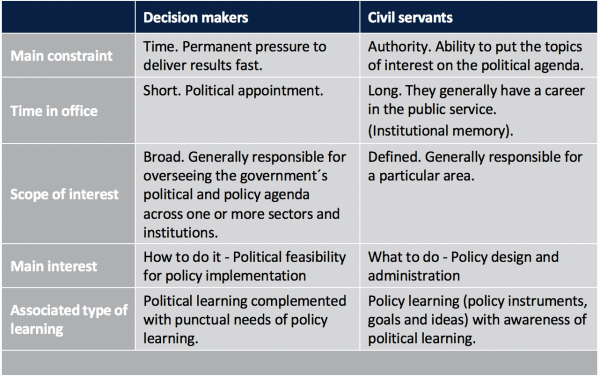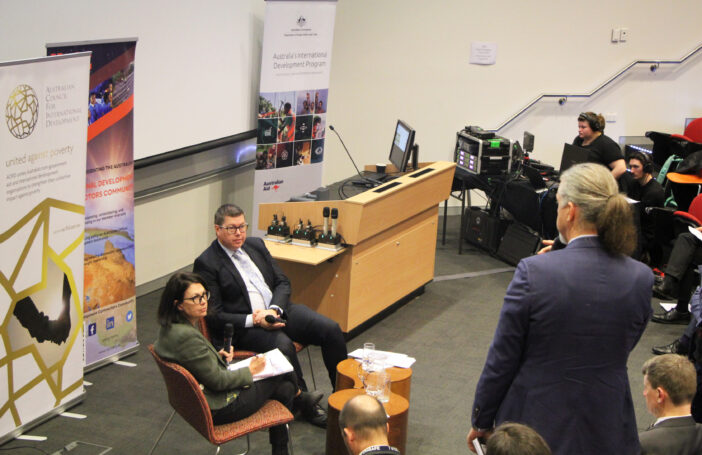There is a difference between learning what to do, which depends on the accumulation and assimilation of knowledge, and learning how to do it, which generally comes through practice. Both are fundamental for successful policy implementation. If training programs and cross-country learning interventions could incorporate this conceptual difference into their design it could strengthen their impact.
Recently I was part of a team working on a project for the Gates Foundation. The aim of the project was to better understand how countries learn from each other and how to translate that knowledge into action. Countries in the Pacific, for example, in spite of having similar levels of income and, arguably, similar constraints, often achieve very different outcomes. For example, Kiribati and Solomon Islands have similar GDP per capita, however Kiribati has an infant mortality rate of 41.2 deaths per 1,000 births while Solomon Islands has a rate of 17.1. The idea of our project with the Gates Foundation was that if countries with similar backgrounds and problems could learn from each other’s experiences and struggles, then this learning could facilitate the implementation of more effective public policies. I did a literature review trying to unpack the concept of ‘learning’. These are the main takeaways.
Learning is a complex phenomenon that has been over-theorised and under-applied. Even agreeing on a unique definition is still an unfinished task. The understanding of learning and its scope varies depending on the interpretation of different authors. However, there are three common elements in the various definitions of learning: someone must learn; there must be an object of learning (something which you are learning about); and there is an expected effect of learning (the impact learning will have in the subsequent policy reform).
The literature outlines two overarching categories regarding the type of learning. On one hand, policy learning is about understanding policy content (problems, goals, instruments, design). When we think about countries learning from each other or about training public servants, this is generally the type of learning that comes to mind. Policy learning is generally about knowing what to do. Political learning, on the other hand, is not as familiar. It is about navigating in the political arena, creating a strong authorising environment, consolidating coalitions for change, achieving quick wins to gain legitimacy and create space for further change, managing communication and messaging, and getting on and staying on the political agenda. Political learning has to do with finding the required backing from the authorisers and relevant stakeholders to implement a reform. It relates more to understanding how to do it.
Differentiating conceptually between policy learning and political learning is useful; but in reality, both occur simultaneously. Learning can be about policy instruments, goals, and ideas, but it is also about politics – such as policy processes, and knowing how to navigate the political arena. While learning about the technical and administrative aspects required to implement a reform is essential, we also need to learn how to implement the reform and how to get the political support that is required to make it happen. If training programs and cross-country learning interventions incorporated both types of learning into their design it could strengthen their impact and could better equip public servants and governments to both design and implement better public policies. The awareness that development is not only a policy problem but also a political process is essential.
One crucial distinction that is not highlighted clearly enough in the literature is that what is learned and the process of learning depends on who is doing the learning. Defining who learns is important, particularly when thinking about the application of lessons learned in other contexts, because the way different actors learn is very different. The literature refers to policymakers, decision makers, and civil servants almost without distinguishing between them. For me, ‘policymakers’ refers to both decision makers and civil servants, meaning that both the political and the technical levels are involved in making policy and learning. ‘Decision makers’ refers to ministers and politicians. Finally, ‘civil servants’ are employees in the public service who are not politically appointed. Different levels of policymakers learn in different ways, depending on their own objectives and constraints. The table below summarises how decision makers and civil servants differ and how that could be incorporated into their learning process. If capacity building initiatives could tailor their interventions distinguishing between these two groups, while also facilitating the awareness in each of them of how to work better together, it could improve the design of public policy and ease the path for reform implementation.
Adequately designed and implemented public policies have the power to transform economies and improve the quality of life of citizens. Governments – and those that work with them, such as development practitioners – are constantly seeking ways to be more effective in public interventions. Learning from each other is a potentially valuable way to achieve greater effectiveness. We can learn to learn better by: i) understanding how learning occurs for different actors; ii) unpacking its complexity into policy learning and political learning; and iii) embracing how learning differs depending on who is doing the learning and the context where it occurs.
For more, see the author’s literature review.







This is a very interesting blog on an important subject. Sandra provides good insights. Once again, it is the Bill and Melinda Gates Foundation helping to generate useful and usable knowledge products through commissioning and funding these and other studies. As it turns out, Professor Sophie Witter and colleagues (including me) recently did a complementary study, also for the Bill and Melinda Gates Foundation, titled “What, why and how do health systems learn from each other: insights from eight low and middle income country case studies”. The article, published earlier this year, is available here. Also available here is a collection of what I personally found to be thoughtful, well-written, and in some cases juicy, “quotable quotes” from the international literature about the political economy of decision making and use – or abuse – of evidence in the health sector of low and middle income countries.
An insightful and well argued paper, thank you.